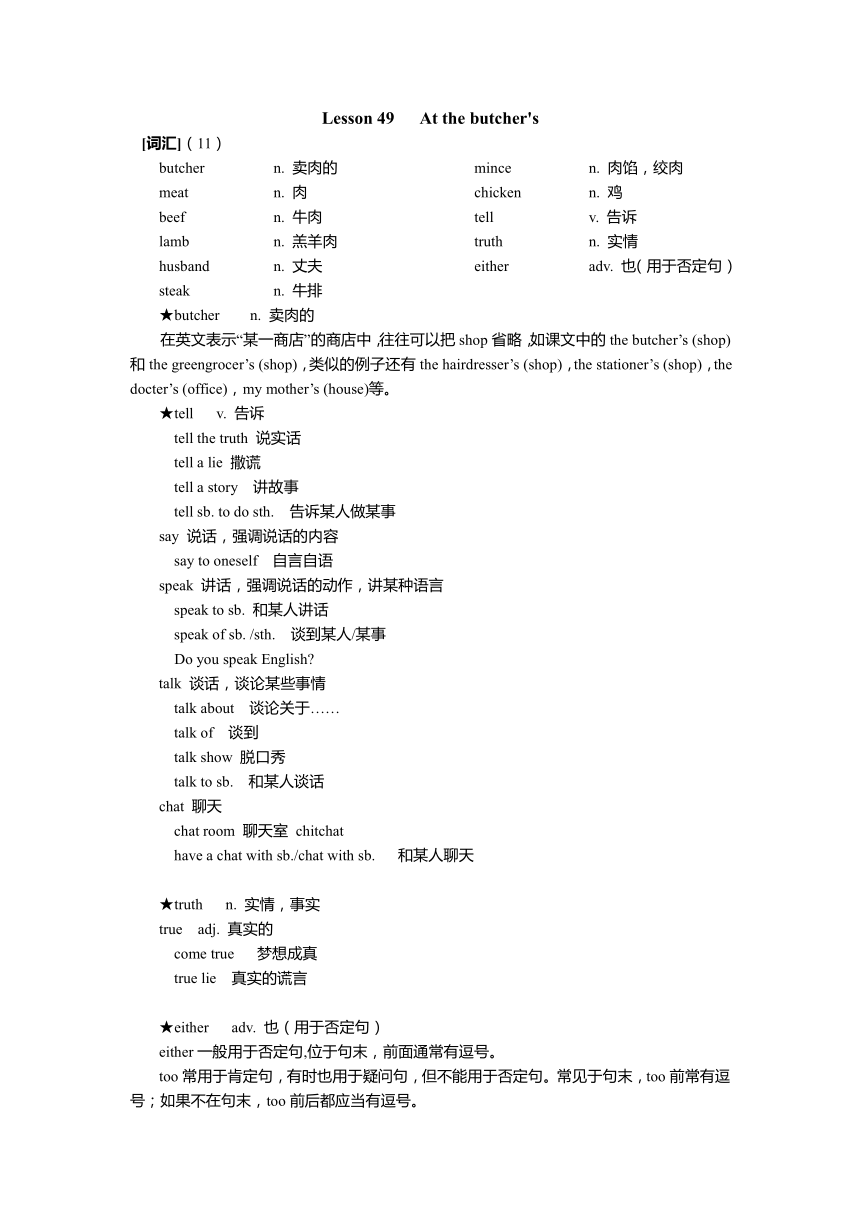Lesson 49-50(讲义)新概念英语第一册
文档属性
| 名称 | Lesson 49-50(讲义)新概念英语第一册 |  | |
| 格式 | docx | ||
| 文件大小 | 20.4KB | ||
| 资源类型 | 教案 | ||
| 版本资源 | 新概念英语 | ||
| 科目 | 英语 | ||
| 更新时间 | 2023-11-08 18:26:56 | ||
图片预览

文档简介
Lesson 49 At the butcher's
[词汇](11)
butcher n. 卖肉的
meat n. 肉
beef n. 牛肉
lamb n. 羔羊肉
husband n. 丈夫
steak n. 牛排
mince n. 肉馅,绞肉
chicken n. 鸡
tell v. 告诉
truth n. 实情
either adv. 也(用于否定句)
★butcher n. 卖肉的
在英文表示“某一商店”的商店中,往往可以把shop省略,如课文中的the butcher’s (shop)和the greengrocer’s (shop),类似的例子还有the hairdresser’s (shop),the stationer’s (shop),the docter’s (office),my mother’s (house)等。
★tell v. 告诉
tell the truth 说实话
tell a lie 撒谎
tell a story 讲故事
tell sb. to do sth. 告诉某人做某事
say 说话,强调说话的内容
say to oneself 自言自语
speak 讲话,强调说话的动作,讲某种语言
speak to sb. 和某人讲话
speak of sb. /sth. 谈到某人/某事
Do you speak English
talk 谈话,谈论某些事情
talk about 谈论关于……
talk of 谈到
talk show 脱口秀
talk to sb. 和某人谈话
chat 聊天
chat room 聊天室 chitchat
have a chat with sb./chat with sb. 和某人聊天
★truth n. 实情,事实
true adj. 真实的
come true 梦想成真
true lie 真实的谎言
★either adv. 也(用于否定句)
either一般用于否定句,位于句末,前面通常有逗号。
too常用于肯定句,有时也用于疑问句,但不能用于否定句。常见于句末,too前常有逗号;如果不在句末,too前后都应当有逗号。
[课文]
BUTCHER: Do you want any meat today, Mrs. Bird
MRS.BIRD: Yes, please.
BUTCHER: Do you want beef or lamb
MRS.BIRD: Beef, please.
BUTCHER: This lamb's very good.
MRS.BIRD: I like lamb, but my husband doesn't.
BUTCHER: What about some steak
This is a nice piece.
MRS.BIRD: Give me that piece, please.
And a pound of mince, too.
BUTCHER: Do you want a chicken, Mrs. Bird
They 're very nice.
MRS.BIRD: No, thank you.
My husband likes steak, but he doesn't like chicken.
BUTCHER: To tell you the truth, Mrs. Bird, I don't like chicken either!
Do you want any beef or lamb
是选择疑问句,本句有两项选择,第一选择beef 念升调,lamb 则读降调。
What about some steak
what about= how about
To tell you the truth
to tell you the truth= to be honest with you
[语法]
动词加 s(es) 规则
1、一般动词直接加-s
2、s, x, sh, ch, z 结尾的单词加 -es 变化
push -> pushes pass -> passes catch -> catches
fix -> fixes buzz -> buzzes watch -> watches wash -> washes
3、辅音字母加y 结尾,要变y为i加es.
try -> tries worry -> worries study -> studies cry -> cries
4、辅音字母+o+es
do -> does go -> goes
动词不定式
动词不定式不能作谓语,其它的都可作。动词不定式就是to+动词原型。
to tell you the truth 告诉你实话吧(动词不定式短语)
To say is one thing. To do is another. 说是一回事,做又是一回事。
some、any用法:
some/any +可数名词复数/不可数名词;some一般用于肯定句,any一般用于否定句或疑问句;但在征求对方意见时希望得到对方肯定答复,some可用于疑问句
I want some books.
I don’t want any books.
Do you want any books
What about… ……怎么样?(征求对方意见)
Would you like… 你愿意……吗?
Would you like some bread
Lesson 50 He likes …
But he doesn't like
[词汇](9)
tomato n. 西红柿
potato n. 土豆
cabbage n. 卷心菜
lettuce n. 莴苣
pea n. 豌豆
bean n. 豆角
pear n. 梨
grape n. 葡萄
peach n. 桃
[词汇](11)
butcher n. 卖肉的
meat n. 肉
beef n. 牛肉
lamb n. 羔羊肉
husband n. 丈夫
steak n. 牛排
mince n. 肉馅,绞肉
chicken n. 鸡
tell v. 告诉
truth n. 实情
either adv. 也(用于否定句)
★butcher n. 卖肉的
在英文表示“某一商店”的商店中,往往可以把shop省略,如课文中的the butcher’s (shop)和the greengrocer’s (shop),类似的例子还有the hairdresser’s (shop),the stationer’s (shop),the docter’s (office),my mother’s (house)等。
★tell v. 告诉
tell the truth 说实话
tell a lie 撒谎
tell a story 讲故事
tell sb. to do sth. 告诉某人做某事
say 说话,强调说话的内容
say to oneself 自言自语
speak 讲话,强调说话的动作,讲某种语言
speak to sb. 和某人讲话
speak of sb. /sth. 谈到某人/某事
Do you speak English
talk 谈话,谈论某些事情
talk about 谈论关于……
talk of 谈到
talk show 脱口秀
talk to sb. 和某人谈话
chat 聊天
chat room 聊天室 chitchat
have a chat with sb./chat with sb. 和某人聊天
★truth n. 实情,事实
true adj. 真实的
come true 梦想成真
true lie 真实的谎言
★either adv. 也(用于否定句)
either一般用于否定句,位于句末,前面通常有逗号。
too常用于肯定句,有时也用于疑问句,但不能用于否定句。常见于句末,too前常有逗号;如果不在句末,too前后都应当有逗号。
[课文]
BUTCHER: Do you want any meat today, Mrs. Bird
MRS.BIRD: Yes, please.
BUTCHER: Do you want beef or lamb
MRS.BIRD: Beef, please.
BUTCHER: This lamb's very good.
MRS.BIRD: I like lamb, but my husband doesn't.
BUTCHER: What about some steak
This is a nice piece.
MRS.BIRD: Give me that piece, please.
And a pound of mince, too.
BUTCHER: Do you want a chicken, Mrs. Bird
They 're very nice.
MRS.BIRD: No, thank you.
My husband likes steak, but he doesn't like chicken.
BUTCHER: To tell you the truth, Mrs. Bird, I don't like chicken either!
Do you want any beef or lamb
是选择疑问句,本句有两项选择,第一选择beef 念升调,lamb 则读降调。
What about some steak
what about= how about
To tell you the truth
to tell you the truth= to be honest with you
[语法]
动词加 s(es) 规则
1、一般动词直接加-s
2、s, x, sh, ch, z 结尾的单词加 -es 变化
push -> pushes pass -> passes catch -> catches
fix -> fixes buzz -> buzzes watch -> watches wash -> washes
3、辅音字母加y 结尾,要变y为i加es.
try -> tries worry -> worries study -> studies cry -> cries
4、辅音字母+o+es
do -> does go -> goes
动词不定式
动词不定式不能作谓语,其它的都可作。动词不定式就是to+动词原型。
to tell you the truth 告诉你实话吧(动词不定式短语)
To say is one thing. To do is another. 说是一回事,做又是一回事。
some、any用法:
some/any +可数名词复数/不可数名词;some一般用于肯定句,any一般用于否定句或疑问句;但在征求对方意见时希望得到对方肯定答复,some可用于疑问句
I want some books.
I don’t want any books.
Do you want any books
What about… ……怎么样?(征求对方意见)
Would you like… 你愿意……吗?
Would you like some bread
Lesson 50 He likes …
But he doesn't like
[词汇](9)
tomato n. 西红柿
potato n. 土豆
cabbage n. 卷心菜
lettuce n. 莴苣
pea n. 豌豆
bean n. 豆角
pear n. 梨
grape n. 葡萄
peach n. 桃
同课章节目录
